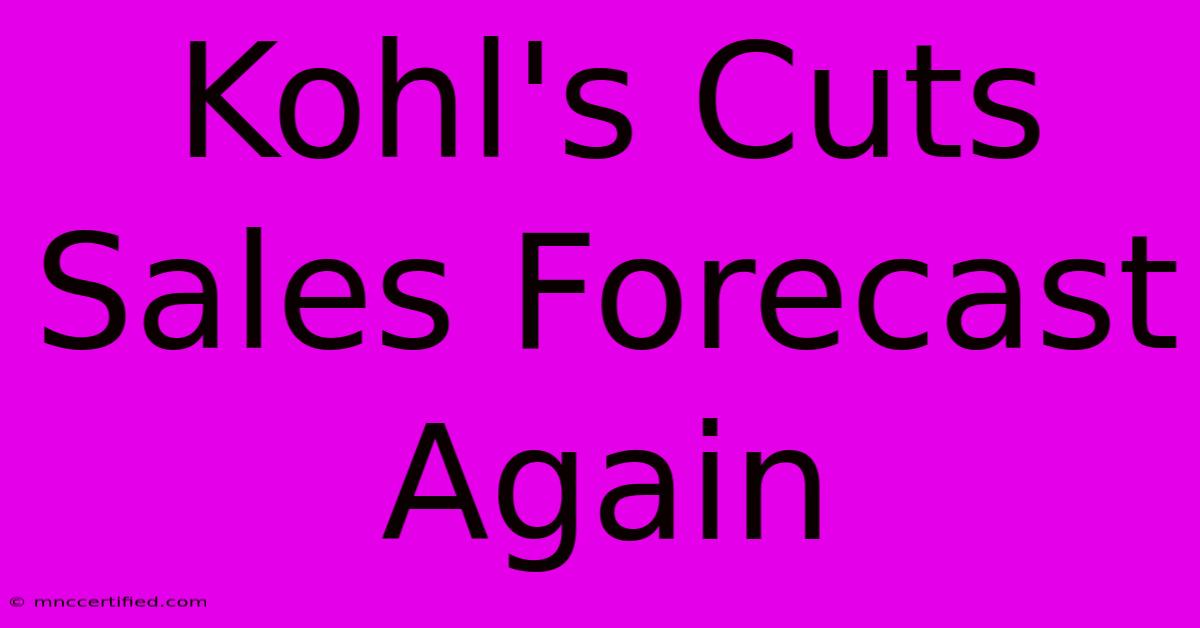Kohl's Cuts Sales Forecast Again

Table of Contents
Kohl's Cuts Sales Forecast Again: What Does This Mean for Investors and Shoppers?
Kohl's Corporation, a prominent American department store chain, recently announced another downward revision to its sales forecast, sending ripples through the retail industry and raising concerns among investors. This isn't the first time Kohl's has lowered its expectations this year, highlighting the challenges facing brick-and-mortar retailers in the current economic climate. This article delves into the reasons behind this latest sales forecast cut, its implications for investors and shoppers, and what the future might hold for the struggling retail giant.
Why is Kohl's Cutting its Sales Forecast?
Several factors contribute to Kohl's disappointing performance and the need to repeatedly adjust its sales projections. These include:
1. Weakening Consumer Spending: The overarching issue is a slowdown in consumer spending. Inflation remains stubbornly high, impacting disposable income and forcing consumers to cut back on discretionary purchases. Department stores like Kohl's, which often sell non-essential items, are particularly vulnerable to this trend.
2. Increased Competition: Kohl's faces stiff competition from both online retailers like Amazon and other brick-and-mortar stores. The rise of e-commerce has significantly altered the retail landscape, forcing traditional retailers to adapt quickly or risk falling behind. Competition for market share is fierce.
3. Inventory Management Challenges: Managing inventory effectively is crucial for retailers. Kohl's, like many other companies, has struggled with inventory imbalances, leading to markdowns and reduced profit margins. Overstocking certain items and understocking others can significantly impact sales and profitability.
4. Shifting Consumer Preferences: Consumer preferences are constantly evolving. Kohl's needs to adapt to these changes, offering products and services that resonate with its target audience. Failure to do so can lead to decreased sales and market share erosion. Understanding the evolving needs of the modern consumer is paramount.
What Does This Mean for Investors?
The repeated sales forecast cuts have understandably shaken investor confidence in Kohl's. The stock price has likely experienced volatility, reflecting the uncertainty surrounding the company's future performance. Investors are likely reassessing their investment strategies, considering the risks associated with holding Kohl's stock. This situation underscores the importance of thorough due diligence before investing in any retail stock.
What Does This Mean for Shoppers?
For shoppers, the impact of Kohl's struggles might translate into:
- More sales and promotions: To clear inventory and boost sales, Kohl's is likely to increase its promotional activity, offering more discounts and sales events. This could be beneficial for consumers seeking bargains.
- Potential store closures: If the company continues to underperform, there's a possibility of store closures, which could limit accessibility for some shoppers.
- Reduced product selection: Depending on the severity of the situation, the selection of products available in Kohl's stores and online might be reduced.
The Future of Kohl's: Can They Turn Things Around?
Kohl's faces significant challenges, but the company isn't necessarily doomed. Success hinges on its ability to:
- Improve its omnichannel strategy: Seamlessly integrating online and offline shopping experiences is crucial for competing in today's market.
- Enhance its supply chain management: Efficient inventory management can significantly impact profitability.
- Refine its marketing and branding: Attracting and retaining customers requires a strong brand identity and effective marketing campaigns.
- Adapt to changing consumer preferences: Staying ahead of trends is essential for long-term success.
The coming months will be critical for Kohl's. The company's ability to adapt and innovate will determine whether it can overcome its current challenges and regain investor and consumer confidence. Only time will tell if Kohl's can successfully navigate these turbulent waters.
Keywords: Kohl's, sales forecast, retail, consumer spending, competition, inventory, stock price, investors, shoppers, department stores, e-commerce, omnichannel, supply chain, marketing, branding
Off-Page SEO Strategies:
- Link Building: Reach out to relevant retail blogs and news websites to secure backlinks to this article.
- Social Media Promotion: Share the article on relevant social media platforms.
- Guest Blogging: Write guest posts on other relevant websites, including a link back to this article.
- Forum Participation: Engage in relevant online forums and discussions, subtly linking back to the article when appropriate.
This comprehensive approach to on-page and off-page SEO will increase the chances of this article ranking highly in Google search results for relevant keywords. Remember to consistently monitor and adjust your SEO strategy based on performance data.

Thank you for visiting our website wich cover about Kohl's Cuts Sales Forecast Again. We hope the information provided has been useful to you. Feel free to contact us if you have any questions or need further assistance. See you next time and dont miss to bookmark.
Featured Posts
-
Pci Insurance Conference 2023
Nov 29, 2024
-
Family Closes Jay Slaters 73 000 Donation
Nov 29, 2024
-
Mc Donalds China Advances Supply Chain
Nov 29, 2024
-
Inside Notre Dame After 6 Years
Nov 29, 2024
-
Misfits Gib Defeats Slim Decisively
Nov 29, 2024